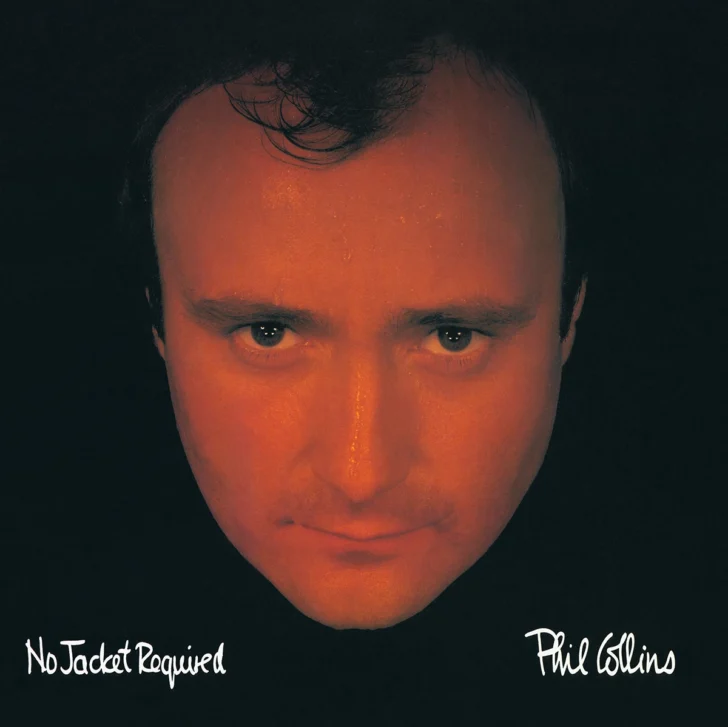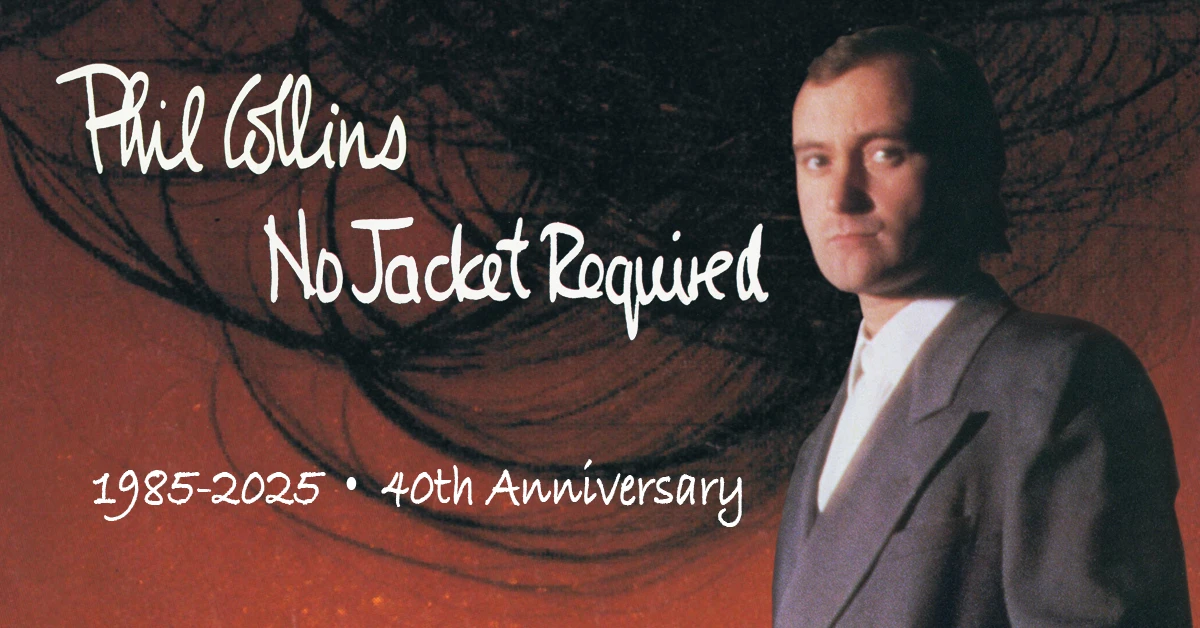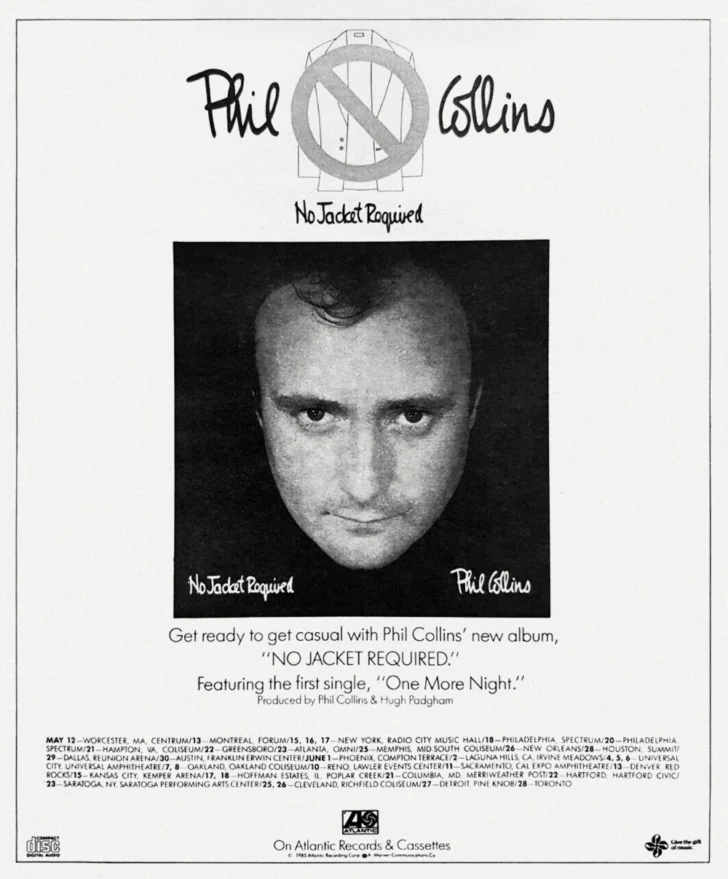- Article
- Read in 6 minutes
Phil Collins – No Jacket Required – review
In 1985 Phil Collins released his third solo album – his most successful to this day.
Prologue
18 February 1985 – No Jacket Required is released. The year promised to become a special year in the life of Phillip Collins (then aged 34). He had always worked hard, but particularly so since 1980, the year he established himself as a serious artist for good. The lively workaholic who had been known to most (if at all) as Genesis’ replacement singer and to experts as one of the best rock drummers set new standards for production and sound and managed to create the work against which all his other output is measured.
A busy man
The four years after that would become an almost incomprehensible tour de force. In 1981 he recorded the feisty Abacab and went on tour later that year. Early 1982 sees the release of Hello, I Must Be Going! which gives him his first solo #1 single in the UK. He produces an album for ABBA’s Frida, tours again with Genesis from August to October, right after which he embarks on his first solo tour. In 1983 Genesis is released and promoted on a tour that lasts until 1984.
During the tour he produces the title song for Taylor film Hackford’s Against All Odds – Collins’ first #1 in the US. In 1984 he produces the album Chinese Wall for Earth Wind & Fire artist Philip Bailey and records the power duet Easy Lover with him. It is hard to believe that with all this going on there is still time for a private life, but everything works just fine for Phil. After his first marriage broke up (an event he covered extensively on his first two albums) he married Jill Tavelmann in 1984 – a fairytale couple, as friends describe them.
All that is missing is a hit album. In 1985 the apprenticeship was over for Mr Nice Guy, the jack-of-all-trades. Time for a pay-off.

Cover
The album title goes back to an incident when Collins was not allowed to enter a certain restaurant in Chicago because his jacket did not fit the dress code.
Following the tradition of previous releases a big photo of the artist’s head graces the cover. Covered with perspiration and illuminated by a dark red light it reminds one of Genesis’ demonic Mama video and conjures a heated, sweaty atmosphere. The inner cover shows Collins in perfect 1980’s Miami Vice style in jacket and running shoes.
Production
The album was produced by Collins himself and his buddy Hugh Padgham with whom he had developed his drum sound in 1980 for Peter Gabriel III. It was recorded between May and December 1984 with Daryl Stuermer on guitar, Lee Sklar on bass, the Phenix Horns, R&B producer and expert David Frank and session sax player Gary Barnacle. Other musicians involved are Arif Mardin (string arrangement), Helen Terry, Peter Gabriel, Sting (backing vocals) and Nick-Glennie Smith (keys).
Collins and Padgham bring on the most up-to-date sound, modern synths, crystal clear horns and a giant drum sound; the drum machine is back. And “there is no Fairlight on this record” – Collins did not use the wide-spread music computer to synthesize various horn and string sounds.
Songs
Sussudio
A thumping hot dance drum machine beat reveals right away what this song is all about. Collins’ love for Motown also brought him to dance music; Sussudio has often been called a rip-off of Prince’s 1999, an accusation Collins never fully denied. The Phenix Horns play a set that still intrigues all brass players. The song itself becomes a live classic, though it loses some of its initial power. The original is a great song that even today is still played in the clubs.
Only You Know And I Know
A strong tom intro, synth bass and wind instruments drive the song. Stuermer, who co-wrote this song with Collins, plays a small guitar solo battle in the bridge. A good song for long car journeys.
Long Long Way To Go
One of the highlights of the album is this song full of deep bass, synth blankets and a quietly pulsing beat. It is a complaint about suffering in war and idleness and the self-imposed passivity of men. The second chorus bring a surprising second voice – Sting’s.
I Don’t Wanna Know
… slams into your ears after the unexpected end of the previous song. Another Collins/Stuermer song with a pleasant chorus. That is all it is.
One More Night
… is the mould for all the later Collins run of the mill ballad cull. As opposed to those One More Night radiates a warmth Collins would never reach again. It developed from an improvisation based on a Roland 808 drum machine beat and turned into one of the most beautiful ballads of the 80s – not to mention the definitive saxophone solo by Don Myrick.
Don’t Lose My Number
The second half of the record opens with another uptempo song based on drum machine. The lyrics are about a run-away called Billy who is evidently looked for by someone… A nice, catchy dance song with a special drum machine-driven beat that was unfortunately lost in later live versions. Who’s playing the guitar? Daryl Stuermer! Great! … Great Sandwich!!
Who Said I Would
A thundering song with Moog bass and vocoder effects. Seems a bit nervous and on edge. Much better live.
Doesn’t Anybody Stay Together Anymore / Inside Out
The first one is a Collins/Stuermer collaboration, the latter Phil’s own. Both songs have good dynamic variations achieved by keeping the verses a bit quieter. Very pleasant.
Take Me Home
A gripping 909 drum beat and electronic kalimbas introduce the best song on the record, actually one of Collins’ Top 5. The lyrics are told from the point of view of a patient in psychiatry ward – the melody and the harmonies are lovely. If messieurs Banks, Rutherford and Gabriel did not envy Collins this song they should have. Incidentally, the backing vocals in the chorus feature Sting and Peter Gabriel – you would not realize that unless you knew it. A fantastic song that has become the final song of all live shows since without losing any of its strength.
We Said Hello Goodbye
This was originally only the B-side of the Take Me Home single before it was included in the CD version of the album. It begins with a string intro arranged by Arif Mardin, who already beautified Against All Odds. Then a piano begins to hammer and introduces Phil Collins’ homage to The Beatles (as the title indicates). McCartney piano and Lennonesque vocals. Very good, one of the underrated songs.
All in all
No Jacket Required is in many ways the most positive and warm album of Phil Collins’. One might have expected such an album, as Collins’ voice was as its best and he brought it to bear on songs written with a lot of experience in both writing and producing his material – plus his personal and private situation was on the uprise. It may not by a stroke of genius like his debut, but it is overflowing with surprising harmonies, melodies, and moods. Phil sings with an intensity that sends shivers down one’s spine, an intensity alas no longer present in his voice today. It remains his top-selling album to this day.
Four singles enter the Top Ten all over the world, two even go to #1 in the U.S. He is awarded three Grammies (Best Pop Album, Best Male Vocalist, Best Producer) – he is on top of the music world. Unfortunately a couple of lines he sang in Duchess in 1980 would turn out only too prophetic for him: “Times were hard, too much thinking of the future and what the people might want…” Collins became “serious” and could not free himself of the “soft popper” label. His rock and soul were lost…
A period piece?
No Jacket Required is Mr Collins’ safe bet. The mixture was right, the time was right. Collins was popular and in everybody’s ears. His music fit the time. The only thing one could hold against the album is the (at times) over-eager production and an beginning lack of depth – but that is easily forgiven because in this case it was only rudimentary yet.
I would like to close with the trenchant words of Martin Lewis. He spent much time with Phil Collins in the mid-80s. “If he had never done Face Value it would not matter. But he did and touched something real with it. He lost that later. He could have become a John Lennon, but he decided to become Paul McCartney.”
by Bert Wenndorff
translated by Martin Klinkhardt
Your choice! What are your three favorite track from that album? Vote in our forum here.


